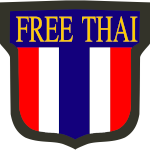Thai Peace Day Date in the current year: August 16, 2026
 Thai Peace Day (Wan Santiphap Thai) is observed on August 16 each year. It was established in 1995 to commemorate the end of hostilities in the Second World War, as well as to honor the members of the Free Thai Movement who helped the Allies fight against Japan despite the fact that Thailand had an alliance with the Empire of Japan.
Thai Peace Day (Wan Santiphap Thai) is observed on August 16 each year. It was established in 1995 to commemorate the end of hostilities in the Second World War, as well as to honor the members of the Free Thai Movement who helped the Allies fight against Japan despite the fact that Thailand had an alliance with the Empire of Japan.About a year after the start of World War II, Thailand fought Vichy France (a collaborationist regime established in France in 1940) in the Franco-Thai War over certain areas of French Indochina. The war ended on May 9, 1941 with the help of Japan that mediated the conflict and coerced the French to cede four provinces to Thailand. After that, the government of Thailand officially adopted a position of neutrality.
However, Thailand’s neutrality didn’t last long. On August 8, 1941, the country was invaded by Japan. After several hours of fighting, Thailand signed an armistice and granted Japan permission to use its territory as a base of operations to invade Burma and Malaya. In December, Japan and Thailand formally signed a military alliance, and a month later, Thailand declared war on the United States and Great Britain.
However, Seni Pramoj, the Thai ambassador in Washington, refused to deliver the declaration of war because he didn’t support the pro-Japanese policy of Plaek Phibunsongkhram’s government. After that, the United States government recognized him as the legal representative of Thailand, granted him access to the frozen Thai assets, and helped Seni organize an anti-Japanese resistance movement, which was named Seri Thai (Free Thai).
The movement recruited Thai students studying at Harvard, the MIT, Cornell and other American colleges and universities to work with the Office of Strategic Services (OSS; a US intelligence agency that was a predecessor to the CIA). Trained recruits infiltrated Thailand to carry out underground activities; for example, they broadcast weather reports to the Allied air forces and helped rescue downed Allied pilots.
During the war, the OSS trained and armed over 50,000 Thai resistant fighters. Among them were future Air Chief Marshal Siddhi Savetsila, future prime ministers Thawi Bunyaket and Pridi Banomyong, future Minister of Foreign Affairs Direk Jayanama, future Governor of the Bank of Thailand Puey Ungphakorn, and even some members of the Thai royal family. Former Queen Consort Rabmai Barni, for example, wasn’t an official member of the Free Thai Movement, but she used her connections to assist the resistance through fundraising.
The Free Thai Movement fought the Japanese until the end of the war. On August 15, 1945, Japanese Emperor Hirohito announced to his people that Japan had surrendered. This day can be considered to be the last day of World War II, although the surrender of Japan was formally signed on September 2.
In 1995, the Council of Ministers of Thailand declared August 16 – the day following the proclamation of Japan’s surrender – as Thai Peace Day. It was established to commemorate the 50th anniversary of the end of World War II, as well as to honor the members of the Free Thai Movement and all those who had died during the war.
Thai Peace Day is marked with memorial ceremonies attended by government officials, members of parliament, Thai military, representatives of various organizations and institutions, foreign diplomats, descendants of members of the Free Thai Movement, and the general public.
- Category
- Anniversaries and Memorial Days
- Country
- Thailand
- Tags
- Thai Peace Day, holidays in Thailand, observances in Thailand, World War II, Free Thai Movement